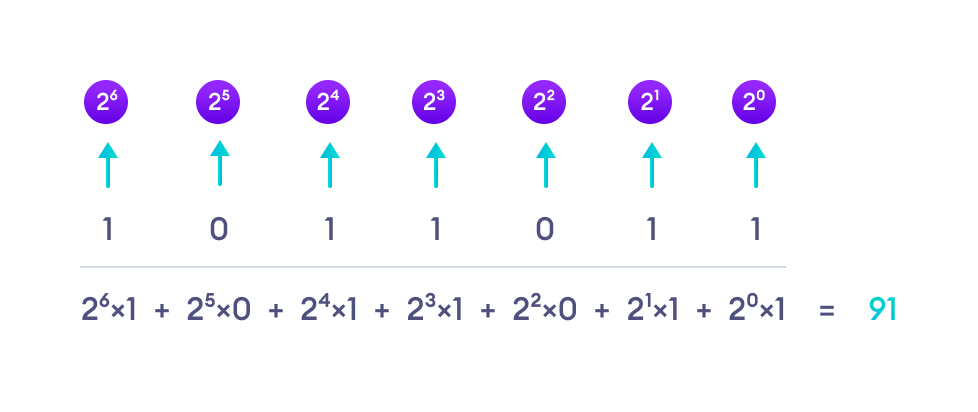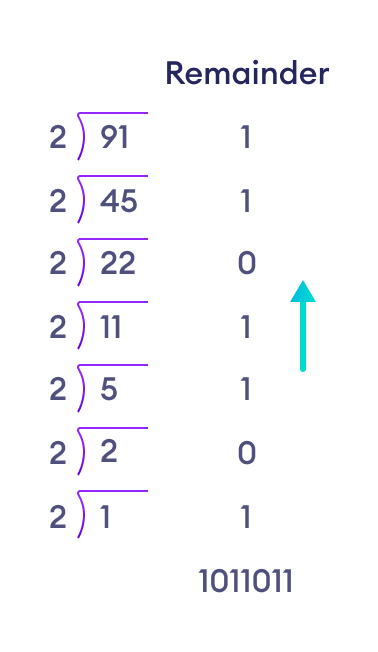Convert Binary Number to Decimal Number
Binary numbers are numbers consisting only of 2 digits: 0 and 1. They can be expressed in the base 2 numeral system. For example,
10 (2), 1000 (8), 11001 (25)
Decimal numbers are numbers consisting of 10 digits: 0, 1, 2, 3, 4, 5, 6, 7, 8, 9. They can be expressed in the base 10 numeral system.
18, 222, 987
Here, we will be writing a Java program that will convert a binary number into decimal and vice versa using built-in methods and custom methods.
Example 1: Binary to Decimal Conversion Using Custom Method
class Main {
public static void main(String[] args) {
// binary number
long num = 110110111;
// call method by passing the binary number
int decimal = convertBinaryToDecimal(num);
System.out.println("Binary to Decimal");
System.out.println(num + " = " + decimal);
}
public static int convertBinaryToDecimal(long num) {
int decimalNumber = 0, i = 0;
long remainder;
while (num != 0) {
remainder = num % 10;
num /= 10;
decimalNumber += remainder * Math.pow(2, i);
++i;
}
return decimalNumber;
}
}
Output
110110111 in binary = 439 in decimal
Here's how the above program works:

Example 2: Binary to Decimal Conversion Using parseInt()
class Main {
public static void main(String[] args) {
// binary number
String binary = "01011011";
// convert to decimal
int decimal = Integer.parseInt(binary, 2);
System.out.println(binary + " in binary = " + decimal + " in decimal.");
}
}
Output
01011011 in binary = 91 in decimal.
Here, we have used the parseInt() method of the Integer class to convert a binary number into decimal.
Example 3: Decimal to Binary Conversion using Custom Method
class Main {
public static void main(String[] args) {
// decimal number
int num = 19;
System.out.println("Decimal to Binary");
// call method to convert to binary
long binary = convertDecimalToBinary(num);
System.out.println("\n" + num + " = " + binary);
}
public static long convertDecimalToBinary(int n) {
long binaryNumber = 0;
int remainder, i = 1, step = 1;
while (n!=0) {
remainder = n % 2;
System.out.println("Step " + step++ + ": " + n + "/2");
System.out.println("Quotient = " + n/2 + ", Remainder = " + remainder);
n /= 2;
binaryNumber += remainder * i;
i *= 10;
}
return binaryNumber;
}
}
Output
Decimal to Binary
Step 1: 19/2
Quotient = 9, Remainder = 1
Step 2: 9/2
Quotient = 4, Remainder = 1
Step 3: 4/2
Quotient = 2, Remainder = 0
Step 4: 2/2
Quotient = 1, Remainder = 0
Step 5: 1/2
Quotient = 0, Remainder = 1
19 = 10011
Here's how the program works:

Example 4: Decimal to Binary Conversion using toBinaryString()
We can also use the toBinaryString() method of the Integer class to convert a decimal number into binary.
class Main {
public static void main(String[] args) {
// decimal number
int decimal = 91;
// convert decimal to binary
String binary = Integer.toBinaryString(decimal);
System.out.println(decimal + " in decimal = " + binary + " in binary.");
}
}
Output
91 in decimal = 1011011 in binary.
Here, the toBinaryString() method takes an integer argument and returns the string representation of the number in base 2 (binary).
Also Read: